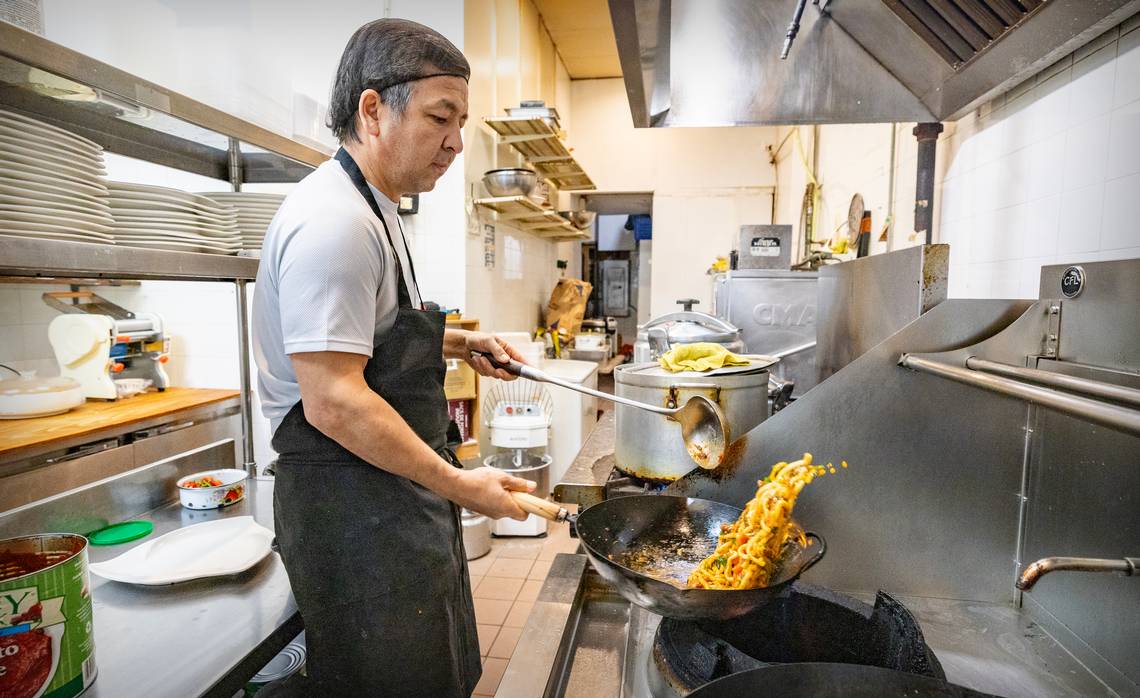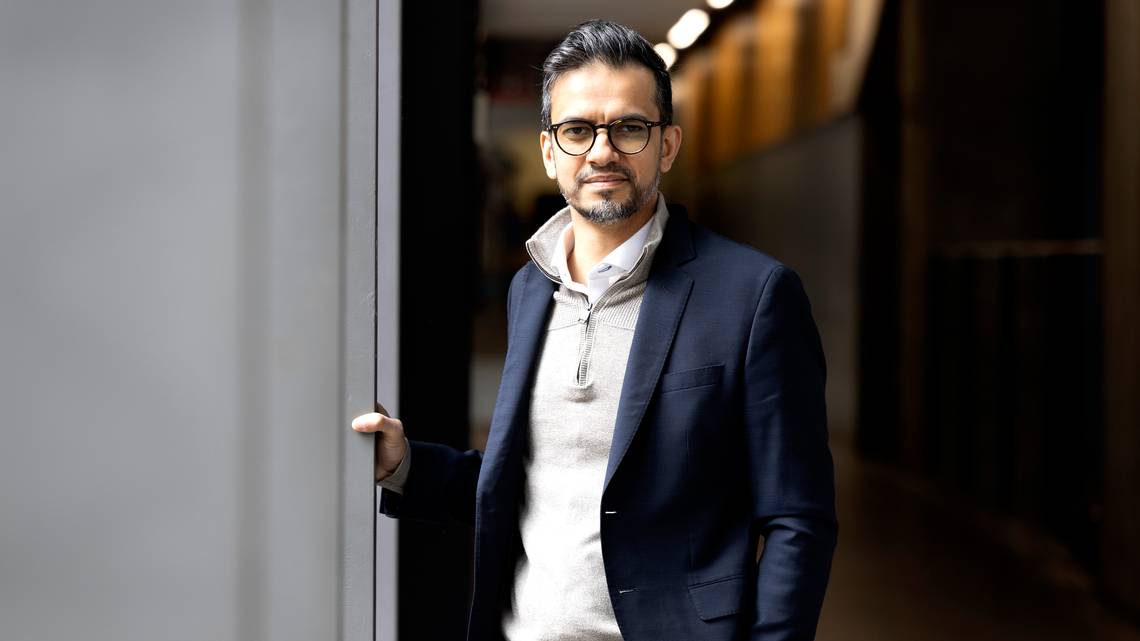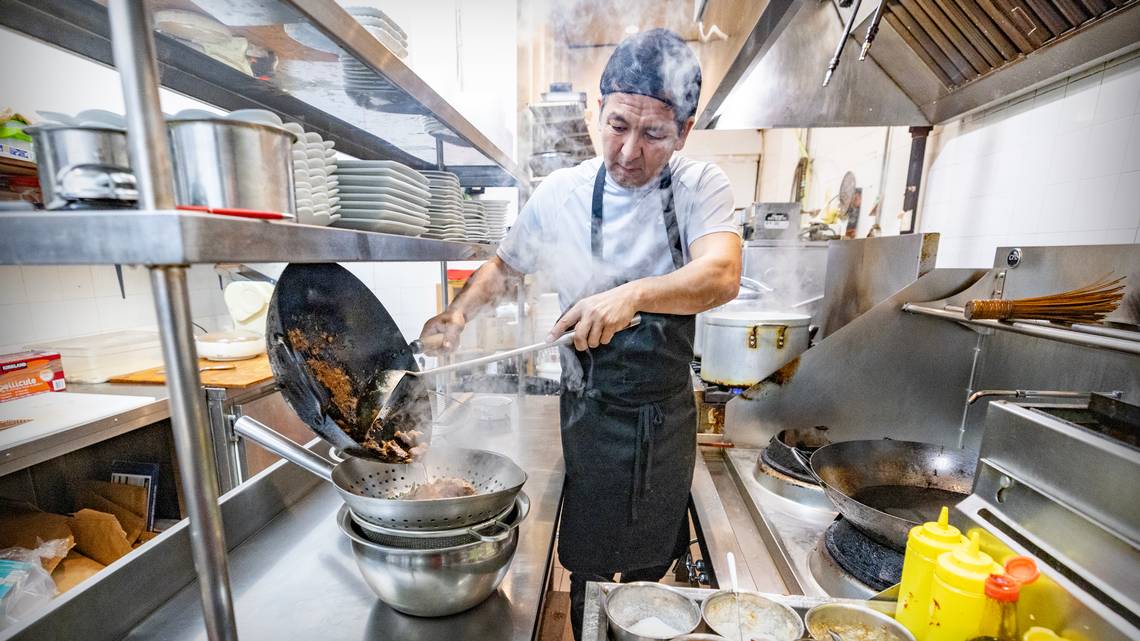Owner-chef Tursun Rozi makes a dish of stir-fry noodles at his Urumqi Ozgu Uyghur Restaurant in the LaSalle borough of Montreal Wednesday March 19, 2025. John Mahoney Montreal Gazette
By Jack Wilson
April 14, 2025, The Gazette
Since it opened in 2019, a restaurant in a nondescript LaSalle strip mall has in many ways become a cultural hub for Montreal’s Uyghur community.
Alongside traditional Uyghur fare — heavy on lamb and including stir-fries, kebabs and a traditional meat pie — Urumqi Ozgu Uyghur Restaurant sells Uyghur-language books, distributing some texts for free. On Fridays and Saturdays, Uyghur musicians perform concerts.
The Uyghur community in Montreal is a small one, where “everyone knows everybody,” said Tursun Rozi, the restaurant’s owner.
Kayum Masimov, who represents Canada to the World Uyghur Congress, estimates that the Montreal community numbers around 500 people. Now — at least in theory — that community is about to grow.
Chinese state repression against Uyghurs, who are native to the Xinjiang region of the country, has included the detention of an estimated one million people in hundreds of facilities across the region, according to Human Rights Watch. Considered a genocide by the House of Commons, the repression has seen Uyghurs flee China in the thousands, often to Central Asia and Turkey.
In February 2023, the House of Commons unanimously approved a motion calling on federal immigration officials to bring 10,000 Uyghur and other Turkic Muslim refugees into the country between 2024 and 2025. But that promise has been slow to get off the ground.
To date, the MP behind the motion says the program has only resettled one refugee.
Rozi and his family came to Canada from the Xinjiang region in 2017, leaving an area where, alongside mass incarceration, China has allegedly subjected Uyghurs to abuses that include enslavement, sexual violence, forced sterilization, mass surveillance and the repression of the Uyghur language and Islamic faith, Human Rights Watch says.
In some cases, Uyghurs seeking refuge in other countries have been sent back to China. In February, Thailand deported 40 Uyghurs to Xinjiang, drawing condemnation from the United Nations human rights office and refugee agency.
Rozi said he experienced abuses first-hand in China.
“Reading Uyghur books openly and having your children educated in Uyghur would be almost impossible back home,” he said. “The mosques aren’t open right now. You’re not allowed to go in or pray.”

Owner-chef Tursun Rozi makes a dish of stir-fry noodles at his Urumqi Ozgu Uyghur Restaurant in the LaSalle borough of Montreal on Wednesday March 19, 2025. John Mahoney Montreal Gazette
Rozi said his sister and brother have both been imprisoned in detention camps.
With China tightly restricting communications with loved ones abroad, Rozi said getting information about family is difficult.
“The last information was from two years ago. I heard that my brother was released (from a detention camp) recently, but there’s nothing else after that.”
Now in Canada, “I’m able to openly practise my religion, so I can pray,” Rozi said, speaking to The Gazette in a recent interview in Uyghur while his daughter, who asked to stay anonymous, translated. Here, his family no longer faces restrictions on their culture or language, he added.
Rozi said he was happy when Parliament passed the motion to resettle Uyghur refugees.
But “hearing that suddenly one person came and then it kind of halted there made us a bit confused, I guess,” he said. “We understand that the processing in Canada is slow, but I didn’t expect it to be this slow.”
The Liberal MP who authored the motion says he’s just as puzzled.
Sameer Zuberi, who is now campaigning for re-election in Pierrefonds—Dollard, said he’s had many conversations with Global Affairs and Immigration, Refugees and Citizenship Canada representatives, but he still isn’t sure when the resettlement program will pick up.
“I’m always hearing ‘soon,’” he said. “Soon is apparently not that soon.”
Zuberi said he consulted with Global Affairs and immigration officials before penning the motion. “We kind of settled on that language that I put forth” to Parliament, he said.
Since it was passed as a motion rather than a bill, Zuberi said federal agencies aren’t legally bound to resettle 10,000 Uyghurs. But “there’s a very strong moral obligation,” he said, pointing out that while resettlement programs for Ukrainian, Afghan and Syrian refugees were implemented without a vote in Parliament, this program received a mandate from all parties, cabinet and former prime minister Justin Trudeau.
“I think the civil service really needs to be asked about this,” Zuberi said, “because they’re the only ones who are at this point not moving on it.”

Sameer Zuberi, a Liberal MP now campaigning for re-election in Pierrefonds—Dollard seen here on March 25, 2025, authored a motion to bring 10,000 Uyghur and other Turkic Muslim refugees into Canada between 2024 and 2025. Allen McInnis Montreal Gazette
Immigration, Refugees and Citizenship Canada declined The Gazette’s request for an interview.
“Our top priority is the safety and well-being of Uyghurs and other Turkic Muslims abroad, who may live in fear of being returned to China against their will. That is why we are beginning our efforts gradually and carefully,” spokesperson Rémi Larivière said in an email response. “Due to the complex, unpredictable and ever-changing international environment in which we are operating, we have adopted a flexible implementation timeline.”
The agency wouldn’t share any statistics about the refugee program, declining to answer questions about the number of refugees settled or applications in progress on the basis that disclosure of that information would jeopardize the safety of Uyghur refugees.
But Zuberi and two other people familiar with the matter who spoke with The Gazette confirmed that only one Uyghur refugee has arrived under the program. That’s despite Uyghur refugees living outside of China filling out “several hundred applications” for resettlement, Zuberi said.
“I know for a fact that people have been called for interviews in Turkey,” said Masimov, the World Uyghur Congress representative. He too said he didn’t understand why the program has been so slow to secure resettlements.
Zuberi rejected the immigration agency’s assertion that concealing the status of the resettlement program would protect refugees.
“If they wanted to protect people ... people would be on their way to Canada,” Zuberi said.
In the meantime, “Uyghurs are being sent back to China, where they are being grossly mistreated, are facing grave and serious human rights abuses,” he said. “There are long-term detention camps, many call them concentration camps ... where Uyghur people are being indoctrinated — forced to lose their culture, their faith, their traditions.”
Allowing Uyghur refugees to remain in countries like Turkey is no solution, Masimov said, since their lack of legal status leaves them with limited access to services and vulnerable to deportation.
“The only way for these people to get some long-term solution would be to resettle in a country which will accept them, which will host them and give their children some future,” he said.
“It’s high time for people to come and get a new beginning in their life.” “We all have this common feeling of frustration” with the lack of progress in resettling Uyghurs, Rozi said.
Should the program pick up its pace, he said Montreal’s Uyghur community is ready to welcome new members.
“We’ll do everything we can to help them integrate.”
Jack Wilson is a reporter at the Montreal Gazette. He has previously reported for the Sherbrooke Record and worked on CBC’s the Current. He graduated from Carleton University’s Bachelor of Journalism program in 2024.

